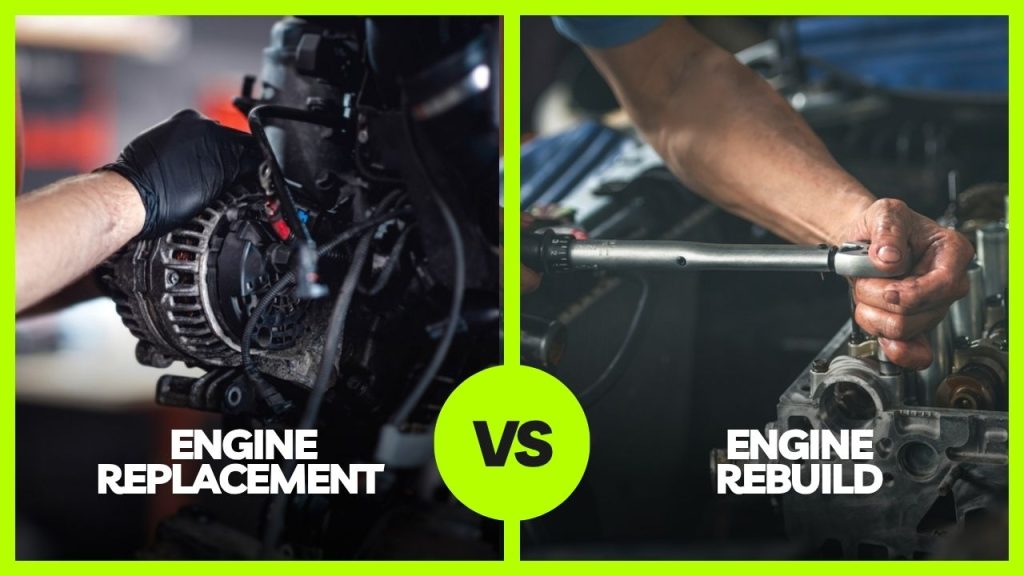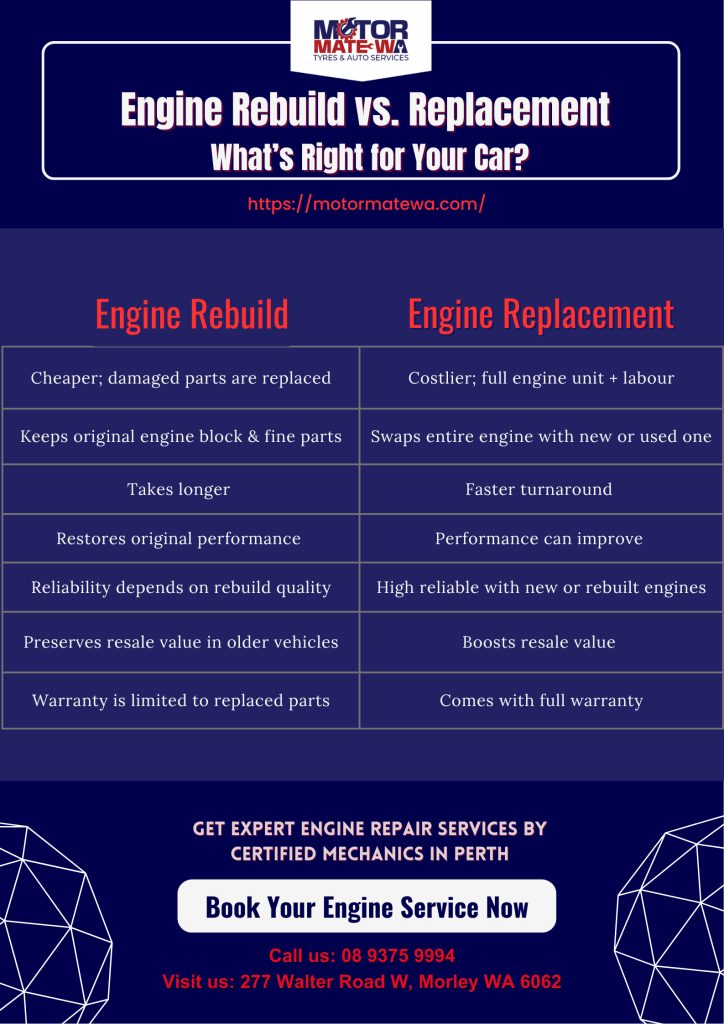Engine Replacement or Rebuild: What’s Best for Your Car?

When your car’s engine starts acting weird, it can cause big headaches and bills. Maybe you’ve noticed odd knocking sounds. Maybe it’s a persistent ‘check engine’ light or your car struggling to uphold power.
For drivers facing these symptoms, one big question is: should I get my engine replaced or rebuilt? It’s a tough call. Because both options have pros and cons involving cost, time, and future reliability.
Well, no fuss! We’ll help you choose and find what’s best for your car. In this guide, we’ll clarify what each process involves, the warning signs to watch for, and all the factors that can affect your decision.
So, keep reading to choose the best service for your vehicle.
Table of Contents
What Is an Engine Rebuild?
An engine rebuild (also called an engine overhaul or reconditioning) means taking your existing engine apart, inspecting and cleaning the parts, and replacing any components that are worn or damaged.
The mechanic will remove the engine and disassemble it completely. Then they’ll swap out parts like piston rings, bearings, gaskets, seals, and sometimes pistons or camshafts as needed. Once all the bad parts are replaced and the engine is carefully reassembled, the result is a rebuilt engine that runs like new.
What Is an Engine Replacement?
An engine replacement means removing your old engine entirely and swapping in a different one; a brand-new from the manufacturer, a rebuilt engine, or even a used engine pulled from another car.
In any case, the old motor is taken out of the car and a replacement engine is dropped in its place. Engine replacement is done when the damage is so severe that rebuilding isn’t feasible or cost-effective. Like if the engine block is cracked or scored beyond repair. This option can quickly restore your car’s performance.
Replacement engines come with warranties (for instance, new engines usually have 12–24 months coverage). And this is reassuring!
Now, let’s break down the reasons you might choose each option.
Why Should You Get Your Engine Rebuilt?
An engine rebuild offers many benefits in the right situation:
-
Engine rebuild saves costs:
Motor rebuild cost is usually cheaper than a full replacement. You only pay for the parts that are bad plus labour, rather than the entire engine.
-
Rebuilt engine boosts car performance:
A properly rebuilt engine can run smoother, quieter, and more efficiently than the worn-out unit did. Replacing old parts with new ones restores (or even slightly improves) fuel economy and power. You basically get a “like-new” engine at a fraction of the cost of new.
-
Environmental Benefit:
It’s kinder to the planet. A rebuild requires far fewer new materials than a brand-new engine. This reduces waste and resource use.
Why Should You Get Your Engine Replaced?
In contrast, replacing the engine can be the smarter move in some cases:
-
Engine replacement is an affordable fix for severe damage:
Surprisingly, sometimes getting your engine replaced can cost about the same or even less than rebuilding a badly damaged engine. If the original engine block is extensively scored or cracked, rebuilding might require so many new parts and labour that replacement is cheaper.
-
Replacing engine is cheaper than a new car:
If your car is otherwise in good shape, an engine replacement can give you a long life at a fraction of the price of a new vehicle. Further, insurance or warranty may even cover part of an engine swap, saving you money.
-
Engine replacement is reliable:
A replacement engine (especially a new or remanufactured one) comes with fresh components and a warranty. With proper maintenance, it should run reliably for many years. This can be more dependable than a rebuilt engine, which depends on the condition of reused parts.
-
Engine replacement reduces downtime
If you use a ready-made replacement engine, the car can be back on the road sooner because the engine doesn’t need to be torn down and rebuilt part by part.
In short, engine replacement is like hitting “reset” on your car’s drivetrain. You pay more initially, but you get the peace of mind of a fresh engine.
Of course, you’ll only consider these services if your engine is truly in trouble. So, read our engine replacement guide to explore warning signs that signal a rebuild or replacement may be needed.
Engine Replacement vs Rebuild: Cost Comparison
So, you wondering how much would it cost to rebuild or replace an engine? The truth is, costs vary widely depending on your vehicle. Here’s a rough breakdown of what you might pay for each route (parts only, before labour):
|
Option |
Approximate Price (AUD) |
Notes |
|
Brand-New Engine |
$1500 to $28,000 |
Genuine new engine (dealer fit only). Top-tier cost with full OEM warranty. |
|
Remanufactured Engine |
$2,500 to $12,000 |
Factory-overhauled or high-grade rebuild (new parts). Mid-level cost. |
|
Used/Salvage Engine |
$2000 to $6,000 |
Used engine from a wrecking yard. Cheapest, but condition varies. Short warranty. |
|
Engine Rebuild |
$5,000 to $25,000 |
Rebuild your existing engine. Cost depends on damage. Cheaper than buying even a used engine. |
Pro Tip: Always ask for a parts/labour breakdown when comparing quotes. Check whether items like timing belts, gaskets, oil, and coolant are included. In fact, a quality repairer will usually replace these during an engine swap or rebuild to avoid future issues. These add-ons mean a complete job can cost more, but also ensure you’re not paying again soon after for related failures.
Engine Rebuild or Replacement Impact on Your Car’s Value
How will this decision play out if you later sell the car? It depends on context:
- Rebuild (Original Engine): Keeping the original engine and just fixing it can help preserve the car’s authenticity, which is important for classic or collector cars. Buyers like knowing the engine hasn’t been swapped.
- Replacement (New Engine): In a younger car, a new engine can be a selling point. People may feel they’re getting a fresh powerplant and better reliability. However, note that if the replacement is a used engine, some buyers might worry about its history or future performance, potentially lowering resale value.
Overall Car Condition Matters: Ultimately, the effect on value also depends on your car’s age and condition. Putting a new engine in a relatively-new vehicle could boost its appeal. But paying for a secondhand engine in an old clunker might not recoup its cost.
In short, rebuilding your engine keeps the car ‘original’ which is good for value. Whereas, shiny new engine can boost confidence for buyers, as long as the rest of the car is in good shape.
Time & Downtime Considerations
Time is money too. Generally, replacing an engine is quicker than rebuilding it.
Why? A rebuild requires careful teardown and inspection of every component, plus machining work if needed. That means days or even weeks in the shop. In contrast, if a mechanic has a ready-made replacement engine, they can drop it in more quickly, since they’re not doing an entire teardown on-site.
Of course, “quicker” doesn’t mean fast; any engine swap or rebuild is a major job. Expect at least a few days off the road either way. Also, remember that a thorough job usually includes extra work including replacing timing belts, gaskets, fluids, filters, etc. For example, a quality engine replacement quote often includes new engine gaskets, a fresh oil change, and even recharging the air-conditioning if it was disconnected. All that adds to the labour time.
Discuss timing with your mechanic. If you need your car back ASAP, a replacement might reduce downtime. But if schedule isn’t urgent and cost is a bigger issue, you might tolerate a longer rebuild time.
With both services defined and explained, let’s compare them directly.
Engine Rebuild vs. Replacement: Key Differences
Here’s a quick comparison of the two options across important factors:

Now, let’s put it all together and see how to choose between rebuilding or replacing your engine.
So, What’s Best for Your Car: Rebuild or Replace?
There’s no one-size-fits-all answer, but consider these points to guide your decision:
- Overall Car Condition: If your car is otherwise in great shape (no rust, good transmission, etc.) and you love it, investing in a rebuild or replacement can be worthwhile. If the car has other major issues, it might be time to reassess.
- Cost Analysis: Compare quotes for both options. Rebuilding is cheaper if only a few parts are bad, but replacement can win out if the engine is seriously damaged. If the quotes are similar, you might choose replacement for the warranty.
- Time Constraints: Need the car back soon? A replacement engine might get you back on the road faster. If you can afford some downtime, a rebuild could save you money.
- Impact on Value: A rebuild maintains originality, whereas a brand-new engine may raise your car’s value in the eyes of buyers. If keeping resale value high is crucial, factor that in.
Ultimately, weigh these factors based on your situation. Consult with an expert auto mechanic to assess the damage and recommend the most economical path.
Got engine troubles and still not sure which path to take? We can help!
Expert Engine Rebuild & Replacement Services in Morley
We are Morley trusted engine repair and replacement specialists. We work with both petrol and diesel engines (yes, diesel engine overhauls too!) to get your vehicle running smoothly again. We use quality reconditioned engines and parts whenever possible to save you money without cutting corners.
Don’t let a failing engine leave you stranded.
Let our expert car mechanics in Perth diagnose the issue quickly. Contact us now for a complete engine diagnostic and personalized solution.
Book an Engine Repair Service Now
FAQs
How do I know if my engine needs a rebuild or a replacement?
Severe block damage (cracks, deep scoring) usually means replacement; worn components, leaks or knocks often point to a rebuild and get a diagnostic to be sure.
Will a rebuilt engine be as good as new?
A quality rebuild restores performance and reliability, but warranties and long-term reliability can be stronger with remaining/new replacements.
How long will my car be off the road?
Replacements can be faster if a ready engine is available; rebuilds typically take longer due to teardown, machining and testing.
Do replacements come with a warranty?
Yes, new and remanufactured engines often include 12–24 month warranties; used engines usually have shorter coverage.
Should I get a full quote before authorizing work?
Absolutely, request a parts & labour breakdown and ask what’s included (belts, gaskets, fluids, sensors).

